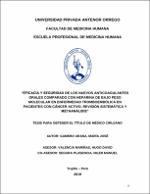Mostrar el registro sencillo del ítem
Eficacia y seguridad de los nuevos anticoagulantes orales comparado con heparina de bajo peso molecular en enfermedad tromboembólica en pacientes con cáncer activo. Revisión sistemática y metaanálisis
| dc.contributor.advisor | Valencia Mariñas, Hugo David | |
| dc.contributor.author | Gamero Arana, María José | |
| dc.creator | Gamero Arana, María José | |
| dc.date.accessioned | 2019-08-28T17:06:08Z | |
| dc.date.available | 2019-08-28T17:06:08Z | |
| dc.date.issued | 2019 | |
| dc.identifier.uri | https://hdl.handle.net/20.500.12759/5334 | |
| dc.description.abstract | Objetivo: comparar la eficacia y seguridad de los nuevos anticoagulantes orales versus la heparina de bajo peso molecular en el tratamiento de enfermedad tromboembólica en pacientes con cáncer activo. Materiales y métodos: Se realizó una Revisión Sistemática de Ensayos clínicos usando Pubmed, Cochrane CENTRAL, MEDLINE y EBSCO. Dos autores independientes realizaron la selección de los artículos, evaluación de riesgo de sesgo y extracción de datos. El resultado de eficacia fue TEV recurrente, y el resultado de seguridad fue sangrado mayor, sangrado no mayor clínicamente relevante y sangrado total. La incidencia y las razones de riesgo (RR) se calcularon para pacientes tratados con NOAC y con HBPM por separado para el metaanálisis. Resultados:495 estudios fueron revisados en título y resumen, 13 en texto completo y 2 fueron seleccionados para análisis cualitativo y cuantitativo. El metaanálisis mostró que los NOAC tienen menor recurrencia de TEV comparado con HBPM (RR= 0.64; IC95% 0.46-0.91), sin embargo, tienen mayor riesgo de sangrado mayor (RR= 1.75; IC95% 1.10-2.77). En relación al sangrado no mayor clínicamente relevante (RR= 2.01; IC95% 0.76-5.30) y sangrado total (RR=1.83; IC95% 0.90-3.71) no se encontró diferencia significativa entre ambos tratamientos. Conclusiones: Los NOAC (rivaroxabán y edoxabán) tienen mayor eficacia en prevenir la recurrencia de eventos tromboembólicos en comparación con HBPM, así como una seguridad comparable con la HBPM, asociados a un incremento en el riesgo de sangrado mayor, así como una tendencia a mayor sangrado no mayor clínicamente relevante y sangrado total. | es_PE |
| dc.description.abstract | Objective: to compare the efficacy and safety of new oral anticoagulants versus low molecular weight heparin in the treatment of thromboembolic disease in patients with active cancer. Materials and methods: A Systematic Review of Clinical Trials was performed using Pubmed, Cochrane CENTRAL, MEDLINE and EBSCO. Two independent authors performed article selection, risk assessment of bias and data extraction. The efficacy outcome was recurrent VTE, and the safety outcome was major bleeding, no major clinically relevant bleeding and total bleeding. The incidence and risk ratios (RR) were calculated for patients treated with NOAC and with LMWH separately for meta-analysis. Results: 495 studies were reviewed in title and summary, 13 in full text and 2 were selected for qualitative and quantitative analysis. The meta-analysis showed that NOACs have lower recurrence of VTE compared to LMWH (RR = 0.64; 95% CI 0.46-0.91), however, they have a higher risk of major bleeding (RR = 1.75; 95% CI 1.10-2.77). Regarding clinically relevant no major bleeding (RR = 2.01; 95% CI 0.76-5.30) and total bleeding (RR = 1.83; 95% CI 0.90-3.71) no significant difference was found between both treatments. Conclusions: NOACs (rivaroxaban and edoxaban) are more effective in preventing the recurrence of thromboembolic events compared to LMWH, as well as a safety comparable to LMWH, associated with an increased risk of major bleeding, as well as a tendency to greater clinically relevant no major bleeding and total bleeding. | en_US |
| dc.description.uri | Tesis | es_PE |
| dc.format | application/pdf | es_PE |
| dc.language.iso | spa | es_PE |
| dc.publisher | Universidad Privada Antenor Orrego - UPAO | es_PE |
| dc.relation.ispartofseries | T_MED.HUMA_2655 | |
| dc.rights | info:eu-repo/semantics/openAccess | es_PE |
| dc.source | Universidad Privada Antenor Orrego | es_PE |
| dc.source | Repositorio Institucional - UPAO | es_PE |
| dc.subject | Neoplasias | es_PE |
| dc.subject | Tromboembolia venosa | es_PE |
| dc.subject | Inhibidores del factor Xa | es_PE |
| dc.subject | Rivaroxabán | es_PE |
| dc.subject | Heparina | es_PE |
| dc.title | Eficacia y seguridad de los nuevos anticoagulantes orales comparado con heparina de bajo peso molecular en enfermedad tromboembólica en pacientes con cáncer activo. Revisión sistemática y metaanálisis | es_PE |
| dc.type | info:eu-repo/semantics/bachelorThesis | es_PE |
| thesis.degree.level | Título Profesional | es_PE |
| thesis.degree.grantor | Universidad Privada Antenor Orrego. Facultad de Medicina Humana | es_PE |
| thesis.degree.name | Médico Cirujano | es_PE |
| thesis.degree.discipline | Medicina Humana | es_PE |
Ficheros en el ítem
Este ítem aparece en la(s) siguiente(s) colección(es)
-
Medicina Humana [2739]

